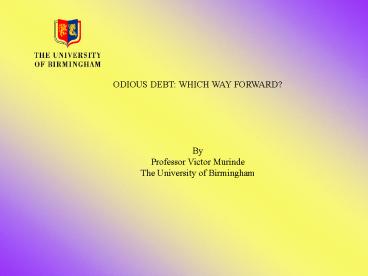ODIOUS DEBT: WHICH WAY FORWARD - PowerPoint PPT Presentation
1 / 16
Title:
ODIOUS DEBT: WHICH WAY FORWARD
Description:
... are carrying huge debts incurred by past rulers who borrowed recklessly ... We need a new approach to prevent profligate dictators from running up debts, ... – PowerPoint PPT presentation
Number of Views:80
Avg rating:3.0/5.0
Title: ODIOUS DEBT: WHICH WAY FORWARD
1
ODIOUS DEBT WHICH WAY FORWARD? By
Professor Victor Murinde The University of
Birmingham
2
- 1. THE ISSUE
- Many African countries are carrying huge debts
incurred by past rulers who borrowed
recklessly - The rulers used the finance either to repress
the people or for personal gains - The duck test!
- Odious debt!
- We need a new approach to prevent profligate
dictators from running up debts, looting
their countries, and passing on their debts to
the population
3
- 2. THE LEGAL DIMENSION
- Surely, the law is clear !
- Individuals do not have to repay if others
fraudulently borrow in their name - Companies are not liable for contracts that
their top managers enter into without the
appropriate authority - These legal precedents imply that sovereign
debt which is neither sanctioned by, nor for
the benefit of, the people is ODIOUS and should
not be honoured by successor governments - This is all the more important if creditors are
aware of these facts in advance
4
- 3. SAMPLE CASES
- Historical case odious debt originated in 1898
after the Spanish-American war - African cases are well-known (duck test)
5
- African cases of odious debt
- Apartheid government of South Africa spent
heavily on police and military to repress the
African majority - The South African people now bear the debts of
their repressors can neither default (credit
risk rating) nor ask for debt forgiveness
(non-HIPC)? - Mobutu Sese Seko (Congo) is thought to have
expropriated US4 billion to personal accounts - Sani Abacha (Nigeria) reportedly held US2
billion in Swiss bank accounts in 1999.
Nigeria recently recouped some of the money.
6
- Outside Africa, cases of odious debts include
- Anastasio Somoza of Nicaragua reported looted
US100-500 million - Ferdinand Marcos of Philippines amassed a
US10 billion fortune - Jean-Claude Duvalier of Haiti is said to have
absconded with US900 million
7
- 4. THE WAY FORWARD A NEW APPROACH
- Researchers have been busy pounding away at
this issue - Michael Kremer and Seema Jayachandran (2001,
2002) - Patricia Adams (1991)
- Victor Murinde (1996)
8
- Existing practice
- African countries repay debt even if it is
odious (the original sin hypothesis?) - If the countries refused to pay, their assets
abroad could be seized, credit ratings would
fall, the countries would neither borrow again
nor attract foreign direct investment
9
- Proposed approach
- An institution to assess and announce whether
regimes are odious - The idea is to create an equilibrium for market
outcome - Countries would refuse to pay illegitimate
funds - The worlds leading powers and international
organisations, declare a regime odious hence a
successor government may repudiate the loan - Unscrupulous private banks?
- Game theory?
10
- Possible challenges and opportunities
- Lending to odious regimes may persist because
not everyone coordinates on the new equilibrium - Three mechanisms are necessary
- First, odious debt should be made legally
unenforcable i.e. the law in creditor
countries should be reviewed to disallow seizure
of a countrys assets for non-repayment of
odious debt - donors could refuse aid into a host country
that is repaying illegitimate claims - moral hazard arguments limit international
bailouts of governments that borrow for
non-economic ends.
11
- Special appeal of the proposed approach
- The new approach is better than trade sanctions
(it is incentive compatible) - While third parties have incentives to evade
most trade sanctions, curtailing odious debt is
a self- enforcing sanction - While trade sanctions often harm the people
they are intended to help, curtailing the
dictators ability to borrow, loot and saddle
the people with large debts would hurt
illegitimate regimes but help their populations
12
- Will the proposed institution be so truthful?
- How do we ensure that the institution charged
with assessing the legitimacy of debt will be so
truthful? - The institution should be empowered to rule
only on future loans to a government and not on
existing debt
13
- Picking the judges? The institutions integrity
- If the regime is odious, then no future
borrowing - A new international judicial body that hears
cases brought against particular regimes,
similar to the International Court of Justice in
the Hague or the proposed International Criminal
Court - United Nations Security Council may block an
odious country from borrowing
14
- A high integrity NGO may be designed to
identify which regimes are odious - The international community jointly with local
NGOs to consider the growing recognition in
international law that some government official
use power illegitimately or criminally - NEPAD peer monitoring.
15
- 5. CONCLUSION
- Africa must break away from the odious debt
- One way forward is to have an institution for
judging odiousness (could take any of the 5
forms) - The idea is to promote legitimate lending and
borrowing, and protect African countries from
odious debt
16
- Creditors would also benefit from knowing the
rules of the game in advance odiousness is
declared in advance and banks face serious risk
of default if they lend - Most importantly, dictators would no longer to
be able to borrow, use the funds for
illegitimate purposes and saddle the people with
the debts. - VERDICT This meeting should form a Task Force
on Africas Odious Debt

